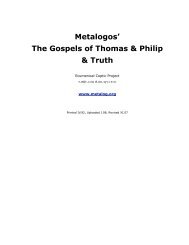Andrew Louth - Syriac Christian Church
Andrew Louth - Syriac Christian Church
Andrew Louth - Syriac Christian Church
Create successful ePaper yourself
Turn your PDF publications into a flip-book with our unique Google optimized e-Paper software.
NOTES 217<br />
5 Possibly an echo of Isa. 9:5 and Eph. 1:11.<br />
6 Composite quotation from Matt. 26:39 and Luke 22:42.<br />
7 Gregory Nazianzen, Sermon 39.13: the subject of Amb. 41, above.<br />
8 Dualist-gnostic teaching established by Mani: see Amb. 5, n. 7 (pp.214–<br />
15, above).<br />
9 Apollinaris (c. 310–c. 390) taught that Christ had no human soul, but<br />
that its place was taken by the Word of God. Behind this teaching lies a<br />
desire to emphasize the unity of Christ, and some of his writings<br />
(circulating under the name of Athanasius) were influential among<br />
Cyril of Alexandria and his followers. The Apollinarian ‘forgeries’ were<br />
exposed in the sixth century in a work once ascribed to Leontius of<br />
Byzantium.<br />
10 Eutyches was condemned at the Council of Chalcedon for his insistence<br />
that after the union there is only one nature in Christ.<br />
11 Maximus probably spent some time in Crete on his way to Africa, where<br />
he arrived 628–30. See the Introduction, chapter 1.<br />
12 Zach. 2:10, 11 (LXX).<br />
13 Quite why Maximus associates Severus with the north (and elsewhere<br />
with the northern characteristics of freezing cold and darkness) is<br />
unclear. It is tempting to think that he was aware of the Slavonic word<br />
for the north, sever. See above, Opusc. 7, n. 5.<br />
14 The contrast here between theology and economy is a traditional one in<br />
Greek theology: theology means strictly the doctrine of God, especially<br />
the Trinity; the economy refers to God’s dealings with humankind,<br />
especially the Incarnation.<br />
15 The heresy traditionally called Sabellianism, to which Maximus later<br />
refers.<br />
16 Because Arius (c. 260–336), condemned at the Council of Nicaea (325),<br />
denied the consubstantiality of Father and Son, and yet maintained<br />
that in some sense the Son is divine, he is often accused of ditheism (or,<br />
as here, of polytheism).<br />
17 Sabellius (third century) denied personal distinctions in the Godhead.<br />
Maximus has already shown how Severus’ teaching could lead to<br />
Sabellianism: see n. 15 above.<br />
18 Matt. 15:13.<br />
19 What Maximus means, I think, is that Nestorius affirms a union of<br />
gnomic qualities, and Severus the difference of natural qualities: i.e.,<br />
Nestorius sees a union in which the divine and the human make up<br />
their own minds, so to speak, to come into agreement, whereas, after the<br />
union, Severus only admits the difference of natural qualities, such as<br />
thirst, speaking, the colour of the hair, but maintains that the divine<br />
and human natures cannot be distinguished.




